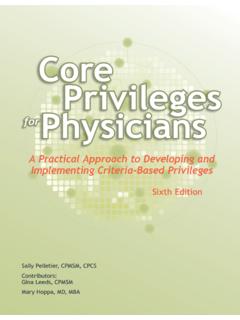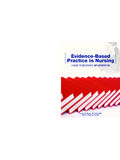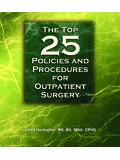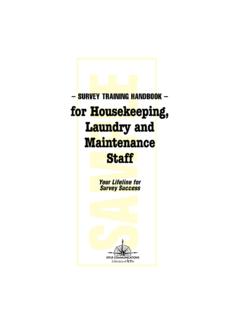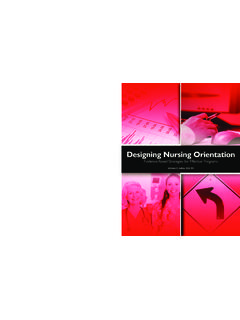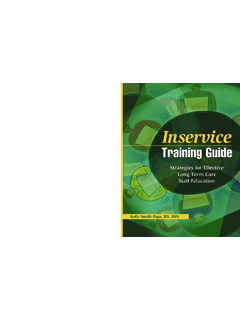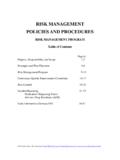Transcription of Scheduling Strategies - hcmarketplace.com
1 Scheduling Strategies for AmbulatorySurgery CentersScheduling Strategies for AmbulatorySurgery CentersDawn Q. McLane-Kinzie RN, MSA, CASC, CNORDawn Q. McLane-Kinzie RN, MSA, CASC, CNOR Scheduling Strategies for ambulatory Surgery centerSAbout the author ..ivIntroduction, by Patrick Doyle ..vThe scheduler as the vanguard ..vInternet capabilities and software ..ixChapter one: Successful surgery Scheduling in the ASC ..1 The steps involved in successful Scheduling ..3 Each person s role in Scheduling ..5 Figure 1 .1: Sample Scheduling process flowsheet ..6 Block Scheduling ..10 Figure 1 .2 Sample modified block schedule ..12 Chapter two: How to hire a qualified surgery scheduler ..13 Figure 2 .1 Sample surgical scheduler position description ..16 Networking with other schedulers ..20 Scheduler interviews ..21 Chapter three: Scheduling roles at your ASC ..29 The physician office scheduler.
2 31 The Scheduling guidelines manual ..33 Policies and forms ..34 Index of sample policies and forms ..40 Chapter four: Information systems for surgical Scheduling ..71 Experior Corp .: SurgeOn ..75 Prescient Healthcare Systems ..81 Source Medical: Advantix and Surgi Source ..86 ContentsSuccessful surgery Scheduling in the ASCC hapter1 Scheduling Strategies for ambulatory Surgery centerSSurgery Scheduling lies at the heart of any ambulatory surgery center (ASC). How well it works determines staff productivity and operating room use: It determines whether the environment is harmonious or is the cause of frutrations in every working aspect of the center. It affects employees, physicians, patients, families, and other facilities. Successful Scheduling , therefore, is crucial to an ASC s success. This chapter flow charts (on p. 6) a sample successful Scheduling process for a typical surgery center.
3 The steps involved in successful scheduling1. Initiate the Scheduling process. The physician office scheduler may use phone, fax, e-mail, or the Internet to communicate with the physician s Successful surgery Scheduling in the ASCC hapter oneoffice depending on what modalities your center chooses to use and how your policies are written. 2. Confirm the patient demographics, the date and time of the surgery, and the procedure and medical diagnosis. 3. Gather insurance information. A copy of the patient s insurance card (front and back the insurance company s phone numbers are usually on the back of the card) is especially helpful for the center s patient account representatives as they confirm the patient s insurance coverage. 4. Verify that the insurance is in your center s network (if required) and that the insurance company will approve a specific procedure. 5. Determine whether the patient has unmet deductible or co-pay amounts that should be collected at the time of service, depending upon your finan-cial policies.
4 6. Collect information about any pre-testing such as lab, x-ray, or EKG tests the physician orders, and where center preop nurses can find that information. 7. Record when anyone is using the special equipment ( a laser or C-arm) that all physicians who use the center share. Doing so will help to ensure that physicians have everything they need when patients arrive for surgery. ch a p t e r o n e Scheduling Strategies for ambulatory Surgery centerSSucceSSful Surgery Scheduling in the aSc Scheduling Strategies for ambulatory Surgery centerS8. Determine whether there are any conflicts that would affect Scheduling of this procedure at the requested date and time. If there are, the proce-dure may need to be performed on a different day or time. 9. Notify the center s materials manager or clinical director about any requests for items that are not normally kept at the center ( , special implant).
5 An experienced surgery scheduler may be able to juggle the schedule to accommodate all cases and their equipment needs. Each person s role in schedulingAs the flow chart reveals, surgery Scheduling touches nearly every function in a surgery center. Patient registrationThis department can and should pre-register a patient using the demo-graphics (including insurance or payer information) provided in the schedul-ing program. Doing so reduces the time it takes to admit a patient on the day of surgery. The registrar will verify this information when the patient arrives. Preop nurseThe preop nurse prepares the chart at least 24 48 hours before the date of surgery. This job includes recording information about the patient s pre-testing and ensuring that the patient s chart is complete. ch a p t e r o n e Scheduling Strategies for ambulatory Surgery centerSFigureSample Scheduling proceSS call from surgeon officeSchedulerReceive fax from surgeon officeSchedulerPreop worksheet to registration and patient account representativeSchedulerInsurance verification/patient call if necessary regarding co-pay/deductibleAccounts receivable specialistPreop phone call for patient history and demographic record verifiedPre-op nurse/admitting clerkVerify information on fax and schedule into block or open time/conflict checkingSchedulerNotify materials manager if resource needed (equipment or implant)
6 Scheduler/materials managerPatient chart completedPreop nurseComplete patient demographics in Scheduling programSchedulerSucceSSful Surgery Scheduling in the aSc Scheduling Strategies for ambulatory Surgery centerSThe preop nurse will then call the patient and gather information known as the history to determine whether he or she is medically appropriate for the ASC environment. If the preop nurse discovers that significant medi-cal history or preop tests are abnormal, the chart is usually referred to the medical director or anesthesia director who determines whether the surgery will be performed as scheduled and whether any other action is needed. The scheduler may also learn important information, such as any special consent or the need for an interpreter. Communicating this information in advance of the date of surgery can prevent delays, cancellations, and nurses, anesthesia providers, and surgeons/physiciansThese staff members live by the surgery schedule.
7 They rely on the sched-ule to include the correct procedure at the correct time, to assign the accurate amount of time for the procedure, and to assign the amount of time necessary to turn-over the operating room between procedures. For their purposes, the schedule must account for the availability of equip-ment and instruments (including implants) and any special requests for the patient s referring physician to attend the surgery. It also must plan to handle credentialing and privileging issues (which absolutely must be done in advance of the date of surgery). The practitioner must observe or participate. Post-acute care unit and Phase II recovery nursesThis group of personnel is probably the least directly affected by the scheduler s actions. However, if something doesn t go as planned in the patient s care, the recovery nursing staff will feel the impact. They may ch a p t e r o n e Scheduling Strategies for ambulatory Surgery centerSexperience backups in the recovery schedule or patients who have high acuity levels and who present additional challenges in the recovery management staffThis part of the ASC team must know in advance of the date of surgery what equipment, instrumentation, or supplies/implants the surgery will require.
8 Materials staff may need to make calls to locate equipment, talk to vendor representatives, and, hopefully, avoid overnight shipping, which can be very expensive and eliminate profits for a particular accounts or receivablesThis department depends on Scheduling to ensure that correct information is provided about the insurance company and payers. If this information is not correct, the claim may be rejected, thus delaying payment. For exam-ple, if implants are billable to your payers, having this information available at the time of Scheduling will prepare coders to add it to the procedure codes when billing the claim. Also note that many payers have multiple addresses ( , Blue Cross Blue Shield) and keeping a copy of the insur-ance card (front and back) will ensure that you use the correct address when entering the patient s demographics and billing the management teamMembers of the management team deal with any problems that result from any breakdown in the Scheduling process.
9 Therefore, managers must hire the right person to perform the Scheduling functions. This position requires an intelligent and responsible person who cares about the quality SucceSSful Surgery Scheduling in the aSc Scheduling Strategies for ambulatory Surgery centerSof his or her work. For more about how to select the right person for the role of surgery scheduler, see Chapter medical staffThe board of managers, medical executive committee, and medical and executive directors are responsible for credentialing and privileging the medical staff and others. Credentialing verifies using specific poli-cies that the practitioner has the education, training, and experience required by the bylaws of the organization (and that the physicians claim to possess) in order to be on the medical staff. Privileging verifies that the practitioner has the education, training, and experience to perform the procedure(s) he or she requests.
10 The scheduler must verify that any prac-titioner/physician who schedules a procedure has been granted the privi-lege to perform the procedures they schedule. The scheduler must notify the management team if any question arises about these and family membersConsumers depend upon the physician office staff to give them the date and time of their surgeries. The scheduler will determine, depending on the procedure and based on a policy, the anesthesia type and what time the patient should arrive at the center to prepare for surgery. Usually preparation takes one hour, but the time may vary. For example, pediatric patients who do not require an IV or whose IV will be started in the oper-ating room may only need to arrive 45 minutes ahead of the surgery s scheduled start time. For procedures in which a regional block is adminis-tered prior to the patient going to the operating room, the patient may be asked to arrive 90 minutes in advance of the scheduled surgery time.
